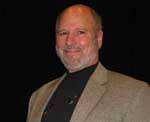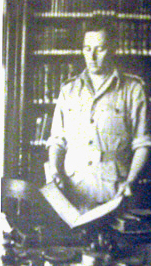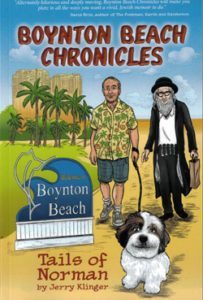By Jerry Klinger


BOYNTON BEACH, Florida — Our little dog, Norman, died this week. He was 13. He loved us, and we definitely loved him. He was more than a family pet whose life had run its course. Norman was the forgotten soul of Israel. He had passed. But because of little Norman, a process began of meaning and memory for all Israel that lives as long as Israel shall live.
Thirteen years ago, I finally got my wife Judy to go to a pet store with me to look for a dog. I have always loved dogs. Dogs and I always get on.
I told Judy we have to think of life. “Doggies are a pain in the ass, but they are living, loving, fun pains in the ass.”
She finally agreed, we would go dog shopping. She knew I still had bad wounds from a project I had completed in Jerusalem, December 2007. A dog was the right answer.
Three seconds later, I was in the car.

The first puppy palace we went to, she held a few little squirming balls of fur. She did not connect to any nor they to her. Disappointed, me more than her, I said “let’s try one more location.”
We went in. We want a loving ball of fur. They plunked a ball of fur in Judy’s lap.
Judy said, “Hi Puppy!”
The ball of fur did not wait a moment. Its Mama had told him before they said their goodbyes if you are plunked into someone’s lap, lick!
No sooner did he get into Judy’s lap, he jumped into her face and started happily licking away. Her heart melted instantly.
They put the little fellow in a box. Outside, sitting in the car, I realized I needed doggie supplies.
“Judy, think of a name. I have to go back in.”
When I came out, she said “his name will be Norman. All I heard about for seven years from you was about Norman, Stephen Norman.”
For seven years of bitter struggle against unexpected Zionist sclerosis, I had fought for the forgotten Zionist, Stephen Norman. I found his lost gravesite in a Southeast Washington, D.C. cemetery. A deep dark depression came over Stephen in the summer of 1946.
Norman died in November 1946, a suicide. He was 27. Stephen had jumped off the Massachusetts Ave. Bridge, plummeting 90 feet to the gorge of Rock Creek Springs.
Stephen Norman was buried the next day in a grave, along a fence, in the old Adas Israel cemetery. A member donated his own reserved space to Norman. A large gathering of mourners stood somberly as the coffin covered with the British Flag, and the blue and white flag of the future State of Israel was lowered into the ground.
Stephen was the last descendent of Theodor Herzl. Norman was his only grandchild.
I read a biography of Herzl 20 years ago. At the back, it said his last direct family member committed suicide in Washington, D.C. I wondered where he was buried? Could I place a stone on his grave and say Kaddish?
Sleuthing, I expected Norman to have been buried in the U.K. Norman had been a British Captain of Artillery during the War. He had nobody in the U.K. that wanted him. The British Embassy did not care. The Washington Jewish community and the Jewish Agency did. They knew who he was.
Stephen never heard much about his Grandfather, Theodor Herzl, growing up. His family were not Zionists. Herzl had bankrupted his family for Zionism. He drove himself to heart failure on behalf of the Jewish people. He alienated himself from his wife. There was no Israel. Herzl was a failure to Stephen’s family.
Chaim Weizmann arranged for Stephen to have a minor job at the British Embassy in Washington, D.C. Stephen had been specifically barred by the British from ever returning to Palestine. He was the last Herzl. He was a symbol of the Zionist vision to the remnants of European Jewry still locked in D.P. camps. No one wanted the Jewish survivors of the Holocaust, not even American Jewry. That summer Stephen received a letter saying his family had been exterminated by the Nazis..
Late 1945, Stephen was passing through Egypt on his way back to England for mustering out. He had a few days before continuing on. He had learned about Herzl. He knew about the horrors of the Death Camps and his Grandfather’s dream of a safe haven for Jews, the 2,000 year old dream, a return to their homeland.
Stephen had become an ardent Zionist. He took the few days of opportunity to see what his Grandfather had begun. He flew to Palestine. He fell in love with the land. He fell deeply in love with the desperate, unrealized dream.
In his diary, he wrote about his experience.
“You will be amazed at the Jewish children in Palestine…they have the look of freedom.”
“When you go to Palestine, you are reborn a little bit. When you leave, you die a little bit. I will return.”
I wrote an article about finding Stephen 20 years ago. The Jerusalem Post carried it. I thought that was that.
The editor saw something in the article. Sol Singer changed the title to “A Zionist Who Deserves to Come Home.” He had seen a meaning, though I had written it, I did not even understand.
Judy read the piece. It struck the mother in her. Stephen died alone.
Judy knew, as did the editor, my mission. She said, “you will bring Stephen home. Home to Israel.”
The simple, do the right thing, turned out to be far more difficult than I ever expected. Every Zionist door I knocked on was locked. They did not care. Stephen was only a forgotten descendent. Bluntly, I was told, they could not make any money selling Stephen.
For seven years, I continued knocking, traveling back and forth to Israel to anywhere or anyone that might be willing to help. Desperate at one low point, the dream I dreamed of Stephen returning home seemed it would never be.
I went to Stephen’s gravesite and collected a bit of soil. I brought it back to Jerusalem and mixed it with Theodor Herzl’s. I took a bit of soil from Herzl’s grave and brought it back to Washington to mix with Norman’s.
With that gesture, something happened. I connected to Prime Minister Ehud Olmert. The head of the Jewish Agency, Zeev Bielski, gave me an impossible requirement, he thought, to bring Norman home. I must get the approval of the Chief Rabbi of Israel, Rabbi Shlomo Amar.
They were confident the mission could not be done. The obsessed American and Norman would go away. Like a dog with a bone, I would not let go.
Rabbi Amar issued a ruling. Stephen may be brought back to rest in the land of his fathers. I had Stephen disinterred.
In December 2007, before a large assemblage on Mt. Herzl in the Plot for Zionist leaders, I sat alongside Bielski and the Austrian Ambassador. I laid a wreath. Cameras flashed, media ogled. Stephen was buried with his family after 66 years alone in exile…
Last week, Norman the doggie’s life ended.
For 13 years, Norman lived, loved, and behaved as doggies do to our delight.
His body had been failing for months. Suddenly, it accelerated. He passed quietly. We sat with him through his last heartbeat at the Vet’s.
Yet, Norman’s story and legacy did not end. From the moment we had brought Norman the pup home, I had learned something. There are many stories and memories that shape who we are as a people and make Israel Israel.
Unfortunately, Israel in its birth and living struggles, has failed to remember its past to shape its future.
In the 13 years of Norman’s life, a process had begun to fix the gaps in Israel’s duty to remember.
During Norman’s lifetime, I completed 15 projects of honored memory in and for Israel. The projects range from Stephen; the first Memorial ever in Israel to the S.S. Exodus; Col. John Henry Patterson; Machal, in Israel and internationally; the Anne Frank Children’s Human Right’s Memorials; even the restoration of the horribly deteriorated, shamefully neglected gravesite of Shmuel Cohen, the musical composer of the Hatikvah and more.
Today more is planned and currently being built for Israel, for Zionism for all Jews everywhere.
I would scratch Norman’s head and tell him good going. He would look up at me quizzically and say, you are not finished.
Norman the doggie, has passed. Norman’s legacy continues.
*
Jerry Klinger is the President of the Jewish American Society for Historic Preservation. www.JASHP.org. He is the author of the lighthearted book, Boynton Beach Chronicles, Tails of Norman.
May his memory be a blessing.
Wow God bless you Behatzlacha